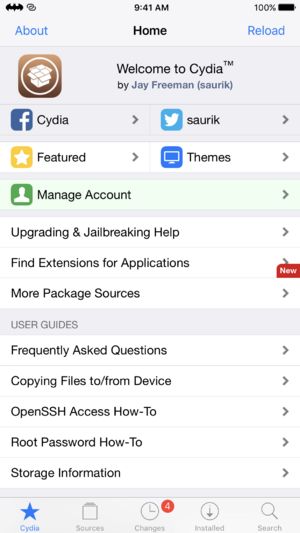Cydia facts for kids
 |
|
| Developer(s) | Jay Freeman (saurik) |
|---|---|
| Initial release | February 28, 2008 |
| Stable release |
1.1.36 / June 24, 2020
|
| Operating system | iOS, iPadOS |
| Available in | English, French, Italian, Spanish, Chinese, Greek, German, Hebrew, Dutch, Polish, Arabic, Vietnamese, Russian etc. |
| Type | Package manager |
| License | GPLv3 |
Cydia is like a special app store for iPhones, iPads, and iPod Touch devices that have been "jailbroken." Jailbreaking means changing your device so it can run software not approved by Apple. Cydia lets you find and install these special apps and tools.
It's also the name of the place where you can get this software. Many things on Cydia are free. Some items, however, you might need to buy.
Cydia was created by a developer named Jay Freeman, also known as "saurik." His company is called SaurikIT. The name "Cydia" comes from a type of moth. This moth, called the Codling Moth, likes to eat fruits like apples.
Contents
What is Cydia?
Cydia gives you an easy way to find and install software. It works on jailbroken iOS devices. Think of it as a special tool that helps you manage and download apps. These apps are not available in Apple's regular App Store.
Cydia uses something called Advanced Packaging Tool (APT). This tool helps organize and install software packages. Jay Freeman brought APT to iOS as part of his Telesphoreo project.
How Cydia Works
Software on Cydia is downloaded from lists called "repositories." These are like different sections or libraries of apps. When you install Cydia, it comes with some basic repositories. You can also add more if you want.
The apps you install from Cydia go to the same place as Apple's own apps. Even with Cydia, you can still buy and download apps from the official App Store. Some tools that jailbreak your device will automatically install Cydia. Others might not.
What You Can Find on Cydia
Many things you find on Cydia are not just regular apps. They are often extensions or changes for your iOS device. These can change how your iPhone looks or how certain apps work. Some repositories on Cydia offer free software. Others have paid changes for jailbroken devices. These changes often use a special tool called Cydia Substrate.
Cydia also has many tools that are usually found on computers that use Unix-like systems. These include tools like bash and OpenSSH. This means your device could act like a powerful mini-computer.
Cydia Store History
For a while, Cydia had its own store where you could buy apps. This store opened in March 2009. At first, you could only pay using Amazon Payments. Later, PayPal was added as an option.
Cydia stopped using Amazon Payments in 2015. This left PayPal as the only way to pay. However, a problem was found with PayPal's payment system. Because of this, Jay Freeman decided to close the Cydia Store. It stopped accepting payments on December 16, 2018.
Device Security
Jailbreaking your device has both good and bad points for security. Some people say that tools from Cydia can make your device more secure. However, installing software from unknown sources can sometimes cause problems. This could include losing data or getting harmful software.
Cydia Substrate is a tool often installed with Cydia. If an installed app causes your device to crash, Cydia Substrate can help. It will restart your device and temporarily turn off any third-party apps. This helps you figure out what caused the problem.
Cydia's Story
Jay Freeman first released Cydia in February 2008. It was an open-source choice to another app called Installer.app. This was for the first iPhone OS.
In August 2009, a magazine called Wired reported something interesting. Jay Freeman said that about 4 million people had installed Cydia. This was about 10% of all iPhone and iPod Touch owners at that time.
In September 2010, SaurikIT, Jay Freeman's company, bought another company called Rock Your Phone. These two companies were the biggest providers of third-party apps back then.
Cydia has been updated many times over the years.
- On December 24, 2013, Cydia was updated to work with iOS 7 and iOS 7.1.
- On October 22, 2014, a team called Pangu Team released a jailbreak for iOS 8.0 to 8.1. Saurik quickly updated Cydia to version 1.1.13. This update added support for iOS 8.
- In February 2018, a developer named CoolStar released a jailbreak called Electra. This allowed Cydia to work on iOS versions 11.0 to 11.1.2. CoolStar also released some updates for Cydia to make it work with Electra. Later, Saurik released his own official update for Cydia on iOS 11.
See also
 In Spanish: Cydia (aplicación) para niños
In Spanish: Cydia (aplicación) para niños
- Linux on Apple devices
 | Sharif Bey |
 | Hale Woodruff |
 | Richmond Barthé |
 | Purvis Young |


